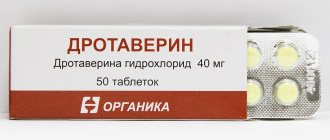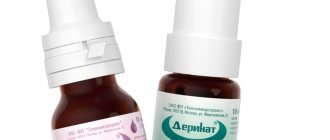While pregnant, women need to carefully monitor their diet. It is necessary to choose hypoallergenic products and try to avoid contact with other allergens. The fact is that pregnancy is a time when the body’s sensitivity increases due to decreased immunity. If an allergic reaction does occur, the doctor may prescribe Diazolin during pregnancy.
An allergy is a non-standard reaction of the immune system to an irritant. Food products, household chemicals and other substances can act as irritants.
Allergy attacks during pregnancy are extremely undesirable, since the antibodies that appear in the mother’s blood also enter the fetus. As a result, the baby becomes prone to allergies. To treat allergies in an expectant mother, Diazolin may be prescribed.
General recommendations
Antihistamines are used to relieve allergy attacks. These drugs also include Diazolin; this drug, if necessary, can be prescribed during pregnancy, although the instructions do not recommend this drug for use during this difficult time for a woman.
So, can Diazolin be used or not during pregnancy? Only a doctor can answer this question. The specialist evaluates the risks created by the reaction of the immune system to an irritant in the expectant mother, and the risks that arise when an antihistamine enters the body. And chooses a solution that reduces threats to the unborn child to a minimum.
https://youtu.be/U7UPDtURnek
Composition and pharmacological action
The active component of the drug is mebhydrolin. This substance affects the mechanism of allergies. Upon contact with irritating substances, histamine is released in the body. This compound causes inflammation, skin rashes, itching, runny nose, and sneezing. Mebhydrolin blocks histamine-sensitive receptors and relieves allergic manifestations.
Diazolin is a first generation antihistamine. This is a fairly old, but proven and effective remedy.
Description
Diazolin is a drug that blocks the production of histamines. This is a second generation medication, it has a systemic effect, so the drug can be used to treat various manifestations of allergies, for example, rhinitis or dermatosis. The active ingredient is the H1-histamine receptor blocker Mebhydrolin, the drug:
- helps relieve swelling,
- eliminates itching,
- has an anti-exudative effect.
Advice! Second-generation antihistamines are good because, unlike their “predecessors” (first-generation antihistamines), they do not have a sedative effect, that is, after taking the drug you will not feel drowsy. In addition, these medications reduce the negative effect of histamine on the smooth muscles of the uterus, which is especially important during pregnancy.
Form
The product is intended for oral use and is available in the form of tablets or dragees. The content of the active substance may vary; most often, a drug containing 50 or 100 mg of mebhydrolin is prescribed.
Reviews about the drug
You can find many positive reviews about taking Diazolin during pregnancy. Pregnant women used this drug in the 3rd trimester. They write that the drug quickly eliminates the unpleasant manifestations of allergies. The patients' skin itching, rash and runny nose disappeared. The drug helped many women survive seasonal allergies during flowering plants. For some patients, this medicine helped avoid such a serious complication as Quincke's edema.
Most pregnant women tolerated this drug well. They note that when the medication is taken correctly, no negative consequences are observed. Using the drug in the 3rd trimester had no effect on the health and development of the baby.
The patient's disadvantages include drowsiness while taking it. The sedative effect is characteristic of first generation antihistamines. However, Diazolin has a much less pronounced hypnotic effect than other similar drugs.
Some patients complained of nausea and stomach pain after taking the medicine. These phenomena usually resolved quickly after dosage reduction or drug discontinuation. However, women prone to toxicosis should take into account such side effects and take the medicine with great caution.
Features of use during pregnancy
Women often ask whether it is possible to take Diazolin while pregnant? It happens that the doctor prescribed this remedy, but the expectant mother refuses to drink it, because the instructions included with the drug do not recommend its use during pregnancy.
You need to understand that each case is individual. After all, allergic reactions in the mother negatively affect the development of the fetus, and in some cases, taking an antihistamine is a lesser evil. Therefore, doctors sometimes make such prescriptions, taking into account factors such as:
- the patient's condition,
- the presence of concomitant diseases,
- trimester of pregnancy.
So, in the first trimester, it is strictly forbidden to take the drug. The first trimester is a difficult time for both the unborn baby and the mother, so a woman needs to be as careful as possible and, if possible, completely avoid taking any medications.
Before the 12th week, Diazolin is not prescribed, since it is a systemic drug. This means that the active substance also enters the blood of the embryo. Such external influence can negatively affect its development or provoke pregnancy failure - spontaneous abortion or cessation of fetal development (frozen pregnancy).
Once the first trimester is over, the risks of complications decrease. The second and third trimester is the time when, if there are strict indications, Diazolin can be prescribed. But this drug can only be taken under medical supervision. Moreover, the drug is not prescribed in case of development of late toxicosis or threat of premature birth.
Is Diazolin safe for pregnant women?
Today, the pharmacological market offers an abundance of various types of drugs to combat allergies.
But, unfortunately, most of them are strictly contraindicated for pregnant women. So expectant mothers have to cope with the problem in the usual way - by taking diazolin. Diazolin
is a second-generation drug, which means it has less pronounced sedative side effects.
It is impossible to say that Diazolin is absolutely safe for pregnant women, but it is definitely one of the few drugs that can have the least negative impact.
How to use?
The instructions recommend taking the drug by swallowing a tablet. Chewing or crushing it in any other way is not recommended. The dosage is selected individually, but most often the standard regimen is used:
- start with a dose of 100 mg (1 or 2 tablets depending on the dosage) once a day;
- if treatment turns out to be ineffective, the dose is increased, the maximum possible dose is 600 mg of the active substance of the drug Diazolin per day.
As a rule, the prescription of one drug is not limited. Allergy treatment must be comprehensive.
Additional measures
The main component of success is avoiding contact with a substance that provokes an allergic reaction. During pregnancy, food allergies most often develop, so in the first days it is necessary to follow a strict hypoallergenic diet.
You can eat turkey, rabbit, veal, rice, buckwheat, a small amount of vegetable oil, and drink weakly brewed tea. After the symptoms are relieved, it will be possible to gradually expand the diet, excluding from it foods that provoke the development of an allergic reaction.
Advice! Most often, allergies are caused by seafood, nuts, chicken eggs, citrus fruits, and strawberries.
If the allergen is dust, then serious measures will be required to “rebuild” your home. First of all, you will need to get rid of all the “dust collectors” - carpets, heavy curtains, soft toys. In addition, you will need to carry out wet cleaning daily.
It is difficult to cope with hay fever, that is, an allergy that develops to pollen. To eliminate contact with the allergen, you will have to wear a mask during the flowering season and try to leave the house less.
Methods to combat allergies without the use of drugs
If allergic reactions occur in pregnant women, it is necessary to establish their cause. Sometimes a rash, itching, cough, shortness of breath or other allergic manifestations are mild and intermittent and disappear after a certain time without any medical intervention.
Sometimes doctors, when diagnosing an allergy, write down in the patient’s chart that the allergy is caused by pregnancy.
Of course, one should take into account the fact that the changes that have occurred in the body of a pregnant woman entail a number of consequences, including an inadequate reaction to previously familiar substances and products. But even during the gestation period, which provokes the occurrence of allergic reactions, allergens should be avoided as much as possible. From the first days of pregnancy, a woman should:
- give up fast food products;
- give up colored carbonated drinks;
- include only seasonal vegetables and fruits in your diet (cucumber or strawberries bought in the middle of winter, as you understand, do not contain the necessary vitamins, but they contain as many chemicals as you like);
- periodically arrange yourself apple, kefir or chicken fasting days, taking into account that chicken must be boiled;
- If an allergy occurs from once-familiar hygiene products, you should discard them too.
If you are careful and take good care of yourself, you will not have to take antihistamines during a dangerous period for the embryo, and, possibly, throughout pregnancy.
Contraindications and side effects
The following conditions are reasons why taking Diazolin is prohibited:
- initial trimester of pregnancy. The fact is that the active substance of the drug negatively affects the development of the embryo;
- gastric ulcers, as well as other diseases of the gastrointestinal tract. The drug may cause exacerbation of painful conditions;
- epilepsy;
- heart rhythm disturbance;
- polyrostenosis;
- angle-closure glaucoma.
The use of the drug by expectant mothers (for a period of more than 13 weeks) is permissible in the presence of strict indications, in the case when the benefits for the expectant mother outweigh the possible risks to the fetus. Pregnant women should strictly follow the recommendations regarding dosage and duration of use.
Side effects
During administration, in some cases, negative side effects develop. Most often, unpleasant gastrointestinal symptoms appear, including:
- pain in the pit of the stomach,
- nausea,
- constipation
The active substance Diazolin irritates the gastrointestinal tract, so this drug should not be taken if erosive changes in the mucous membrane are suspected.
Sometimes there are negative effects from the central nervous system, these are:
- feeling of "goosebumps" all over the body,
- dizziness,
- decreased endurance,
- temporary visual impairment with loss of clarity of perception of objects.
The development of other negative reactions is also possible - disruption of the urinary system, development of edema, increased dry mouth. If these and other negative symptoms appear while taking the drug, you should urgently consult a specialist.
Diazolin during pregnancy can be prescribed under certain conditions. The main condition is the presence of strict indications, that is, severe allergic reactions. In addition, a woman should have no contraindications to taking the drug. In the early stages, prescribing the drug is unacceptable, as it negatively affects the development of the fetus.
Analogues and prices
Diazolin is a relatively inexpensive antihistamine. Its cost varies from 30 to 100 rubles per pack of 10 tablets.
Diazolin is a reliable, time-tested medicine, but the drug is not the safest. Drugs that have a similar effect, but include other active ingredients, can replace Diazolin. These medications include:
These drugs are not complete analogues of Diazolin. They contain other active ingredients.
- Tavegil. The active ingredient of this medicine is clemastine. The instructions for use of the drug contain a clear contraindication during pregnancy, but women suffering from seasonal allergies or in emergency cases when a severe allergic reaction is observed are prescribed Tavegil.
- Pipolfen. The active ingredient in it is promethazine. According to the instructions for use, it is also contraindicated during pregnancy, but for the treatment of allergies, when the benefit for the mother is more important, taking the medicine is necessary.
- Suprastin. Chloropyramine is the basis of this drug. During pregnancy, Suprastin can only be prescribed by a doctor. However, it is still recommended to use products with local effects (gels, ointments, drops).
- Diphenhydramine. Completely contraindicated for use in the first and second trimester, as it can cause premature birth. Diphenhydramine is the main active ingredient of this drug. The medicine is sold only with a prescription, as it has a fairly strong sedative effect. During pregnancy, it is better to use Diphenhydramine ointment, as it does not penetrate the placenta.
You can replace drugs with similar ones only with the permission of your doctor! For pregnant women, this rule should be the most important.
Despite the contraindications, Diazolin is still used during pregnancy.
Reviews say that this is the most effective and safe drug for pregnant women. Despite this, some women complain of the lack of any effect in reducing allergy symptoms. This is most often due to the fact that Diazolin is simply not suitable for a woman. In this case, you should contact your doctor so that he can prescribe another medicine. You cannot prescribe other medications on your own! Doctors have a positive attitude towards Diazolin and most often prescribe these tablets. But a good doctor will always find out the exact cause of a particular allergic reaction before prescribing pills to a pregnant woman. Often, allergies are a specific condition of the body during pregnancy (“runny nose in pregnant women”). If the allergy bothers you only a little, doctors try to prescribe local drugs that will actively fight the allergy only at the site of its occurrence.
It is important to remember that allergies are easier to prevent than to treat. Any drugs have a minor effect on the fetus, which can lead to unpleasant consequences. A pregnant woman should limit her diet (try not to eat foods containing allergens: chocolate, citrus fruits, foods rich in preservatives), and also limit contact with external irritants - fluff, chemicals, animals with thick hair. Often allergies (itchy skin) occur because a woman is very nervous. In this case, you should not resort to the use of antihistamines, just get rid of the irritating factors or drink a mild sedative.
Instructions for use
Diazolin is strictly prohibited for use in the early stages of pregnancy (1st trimester), since at this time all the organs of the unborn child are formed. Mebhydrolin may have a teratogenic effect on the fetus - disrupt embryonic development with the occurrence of anomalies and malformations. Diazolin during pregnancy in later stages (2nd trimester) is indicated if the expected benefits of the drug outweigh the undesirable effects on the body of the expectant mother and child. The 3rd trimester is the safest for taking Diazolin, since by this time the fetal organs are fully formed. However, self-prescription of the drug is strictly prohibited. Diazolin during pregnancy is taken orally, without chewing, during or immediately after meals. Therapy with this drug begins with a dose of 100 mg (1 tablet) 1 time per day. If treatment is ineffective, you can take Diazolin 1 tablet up to 3 times a day. The maximum daily dose of the drug is 600 mg, which is equal to 6 tablets. Diazolin during pregnancy should be used under the strict supervision of a doctor, since the active substance of this drug acts on the smooth muscles of the uterus and penetrates the placental barrier. Allergy treatment must be comprehensive; it is necessary to recognize and eliminate the substance that provokes immune reactions. Most often, pregnant women experience food allergies, so treatment requires 2-3 fasting days on the water. Next, the diet should consist of lean meat and chicken, herbs, vegetables, rice, butter, apples, pears and other hypoallergenic foods. Be sure to avoid citrus fruits, peanuts, dairy products, eggs, soy and seafood. If you have a domestic allergy, daily wet cleaning should be carried out, and all carpets should be removed from the house. In case of epithelioid allergies (to fur, dander, saliva of pets), you should get rid of the source of the allergen - the animal. The household type of allergy requires avoiding the use of a substance that provokes the body’s immune response. Hay fever or seasonal pollen allergy, unfortunately, does not make it possible to completely eliminate contact with the allergen. Pregnant women with this disease are advised to leave the house as little as possible, not open windows, and wear a mask when going outside.











